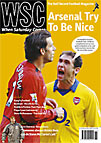 Glenn Hoddle will remain a Tottenham legend, believes Adam Powley, but was undone as a manager by the faults he was always said to possess yet never would admit
Glenn Hoddle will remain a Tottenham legend, believes Adam Powley, but was undone as a manager by the faults he was always said to possess yet never would admit
Tottenham fans now have two things to thank Glenn Hoddle for. A decade of sublime football guarantees his place among the club’s most cherished sons. And, briefly, the club led the back pages again. For fans increasingly desperate to see their side regain its lustre, such dubious comforts are strangely welcome.
Hoddle’s demise speaks volumes not just about his own career as a manager, but also provides a telling illustration of the attitudes of frustrated fans pining for former glories – and shows that favourite players do not necessarily make successful modern bosses.
His departure six games into the new season means he leaves as he arrived – dividing opinion. Contrary to conventional wisdom, when Hoddle returned to White Hart Lane in April 2001, it was not to universal acclaim. Many cautioned that he might not be the long-awaited Messiah, citing his modest record and doubts about his oft-discussed “man-management” problem.
Nonetheless, there was no mistaking the hope he engendered in replacing the unpopular George Graham. Spurs fans had tired of media sermons about how grateful they should be to watch an ineffective team managed by a well funded tactical recidivist. In Hoddle they had a coach cast in the club’s own image, a fan who understood what made the club tick.
Hoddle’s first games had an atmosphere of celebration. “Glenn Hoddle’s blue and white army” became virtually the club song and the team rediscovered the notion that passing was not a sin, culminating in a 5-1 home win over Chelsea in the League Cup semi-final.
But then it all began to go wrong. Defeat in the final exposed the limitations of Hoddle and his side. Unable to counter the drive and nous of Blackburn, Hoddle frowned while his players fumbled. The reliance on experienced but ageing stars was shown to be a stop-gap measure that could not provide the steady progress the board and manager had made a point of principle.
The moaning started. Familiar player complaints surfaced – that Hoddle was uncommunicative, tink-ered too much with tactics, ostracised those he didn’t favour and belittled those he regarded as inferior talents. Hoddle’s detractors in the media sensed blood. To their minds he was arrogant – fine if he was delivering the goods, simply asking for criticism if he wasn’t.
The trickle of critical articles became a flood. The bleatings of unpopular players such as Tim Sherwood may have cut little ice with fans, but mud began to stick. A dreadful run of injuries hardly helped, but Glenn wasn’t doing himself any favours. A succession of embarrassing defeats saw Hoddle absolve himself of any blame while holding others accountable. Hoddle’s stock phrase, “I’m scratching my head as to where that performance came from”, left fans scratching their heads. Few wanted Hoddle to admit his own failings; neither did they want him to damn his players in public.
The flaw in his make-up – his absolute faith in his own abilities to the exclusion of even the mildest criticism or challenge – began to show. An inexperienced board, an allegedly testy relationship with director of football David Pleat and a loyal but demanding home support also combined to create a volatile mix.
What ultimately cost Hoddle his job, however, was results. Had the team made progress, everything else would have been forgiven. But after two and a half years and £34 million, Hoddle’s Spurs were much like any of the mediocre editions of the previous ten years. His parting statement said it all. “No one could have tried harder to turn things round for the club,” he said, offering nothing about his own culpability.
And so to the future. Enic’s vaguely Stalinist talk of a “five-year plan” has predictably been rendered useless and attention has now focused on chairman Daniel Levy and stand-in boss Pleat. So too the players, who now have no excuse for collective underachievement.
But perhaps fans also need to think about their part in a sorry saga. Steven Howard, in the Sun, served up a classic piece of tabloid hypocrisy when he wrote: “I have a certain sympathy for a man who had Tottenham tattooed on his heart.” But he had a point in adding: “You can have little sympathy for either the men who run the club or the people who support them.”
This wasn’t simply an exercise in Spurs-bashing, but referred to the plain truth that by and large the supporters got what they wanted. Many clamoured for Hoddle and can have little complaint if things haven’t worked out. Fans have continued to sing Hoddle’s name. If there is a consensus, it is that Glenn had to go, but his image as a player has survived his failings as a manager. It seems clear, however, that there was too much in the way of expectation – Hoddle always talked about the pressure that came with the job, of being the chosen one the fans were willing to succeed.
As to the new man, perhaps Spurs would be better off with a boss who has no such connections. It may mean fewer back page headlines – but it might result in the progress the fans and club so earnestly desire.
From WSC 201 November 2003. What was happening this month